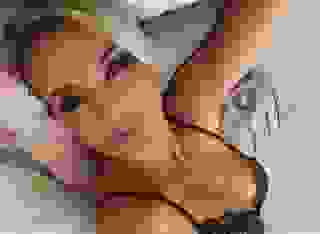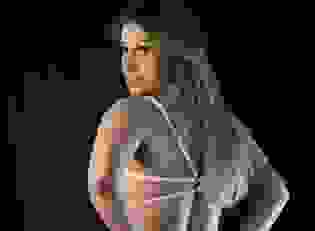Note: You can change font size, font face, and turn on dark mode by clicking the "A" icon tab in the Story Info Box.
You can temporarily switch back to a Classic Literotica® experience during our ongoing public Beta testing. Please consider leaving feedback on issues you experience or suggest improvements.
Click hereThe old sergeant growled his acquiescence, and stepped away from Minnie, breaking her hold and letting her drop to the pavement. As she started to get up, he placed his foot on her ass and pushed, sending her face first into the street.
Kirk immediately put a damper on the telepaths' flare of anger, letting them know that the sergeant would be near the top of the list of those who received a lesson in interplanetary relations. He told the team they had all the information they needed for the present and to prepare to return.
The old sergeant had been a treasure trove of intelligence. Coupled with what they had learned from Susie's encounter earlier, they now knew that the stadium housed six of the compact field pieces, one of the largest concentrations of firepower on the two continents in the Western Hemisphere; that at any time during the night, the odds were that there would only be two guards awake; that the artillery was kept in the end zone, furthest from the street.
A major reason for the security precautions was the extremely highly polished surface on the projectiles and the inner surface of the barrel. Both were machined and polished to +/- 30 nanometers (3 ten-thousandths of a micron). Any imperfection on the surface of the shell or the barrel larger than 30 nanometers rendered both useless.
The artillery pieces were constructed of extremely hard metal, generally corrosive resistant. At least they had been on other invasion sites. Something in Earth's atmosphere, in the acid rain, threatened to corrode the inside of the barrels, so they were kept under special tarpaulins, to filter the corrosive ions from the air. The invaders had learned as little as three hours exposure to the unfiltered atmosphere was enough to disable the compact field pieces.
More importantly, Kirk had learned, this invasion had come with another set of problems not foreseen by the invaders. His destruction of the hatchery, and of the three breeders assigned to it that night, had destroyed two percent of the breeders mature enough to be productive. The breeders 'grown from earthly seed,' so to speak, were taking exceptionally long to mature.
On other planets, native hybrids were ready in a few as nine months from implantation in their native hosts. On Earth, the officers overseeing that part of the invasion, estimated that new breeders would not be productive for over five years after implantation.
The genetic code in the human DNA they absorbed from their hosts which controlled the rate of sexual development, necessary to enable impregnation and successful implantation, was interfering with the maturational process of the hybrids.
In addition, it seemed, some human women were able to differentiate between the fighting drones which were implanted in them and the breeding drones. Statistically, some spontaneous miscarriages were to be expected. Breeding drones, which represented about two out of a thousand implantations, were being rejected at a rate where they represented 10 percent of the unsuccessful pregnancies, some twenty times the expected rate of miscarriage for breeding drone fetuses.
While most of the breeders were relatively young, because of the demands on their bodies to produce viable drones, and to satisfy the sexual needs of the officers, their reproductive life was only about five or six years. Kirk realized that if the alien breeders were destroyed, the supply of fighting drones could be exhausted before the hybrids were productive.
He called his advisors together and reviewed what he had learned, and they made their plans. First, the directive went out to all telepaths: Eliminate the hatcheries and the breeding drones, especially the breeders. The best way to identify them-- they had two extra penicles. Plus, it was suspected that they were hermaphroditic.
Next, the information about the artillery pieces was sent to the other telepaths, along with the recommendation that the special tarps be removed during nights when it was raining. Kirk reasoned that the hogfaced invaders didn't like the rain any more than they liked other running water, and would not be likely to walk out and inspect the artillery pieces in wet weather.
The lightly corrosive rain, over time, would deteriorate the barrels, and the shells, making them useless. With such tight tolerances for the surfaces, refacing the projectiles or the barrels was out of the question, even if the invaders had the equipment to do so, since it would require the removal of material, opening the gap between shell and cannon, exceeding the necessary tolerance limits.
Kirk and his team planned a war of attrition--slowly eating away at the strength and morale of the invaders. Over the next few years, they would teleport into a post and kidnap a soldier or officer, using mind control to keep them quiet and compliant.
Once away from the compound, the invader was either killed outright, or used as bait, to lure the aliens or their drones into a lake or river, where they were immediately disabled and destroyed. Dead bodies, with no visual wounds, were left to be found by garrisons several hundred miles distant.
Invaders in the more arid atmospheres would suffer similar fates as the fighting drones attempted to march across the sharp sands of the deserts, cutting open their feet, and quickly dehydrating and dying.
It was slow, but it was guaranteed to be successful. Invaders who responded by attacking non-combatants found themselves being used as bait the next day, a lesson which was quickly learned by the officers and soldiers. A lesson taught by the old sergeant who had pushed Minnie to the street.
After the planning session, Kirk went to find Minnie, to see how badly hurt she was. She was lying on a bed with Mary and Tiffany working on resetting her broken nose, and cleaning the dirt from the scrapes on her forehead and cheeks. "Hey, Min, how you doing?"
"I'm alright, Kirk. I just wish I could have fried that bastard."
"I understand. If you hadn't been so close to their barracks, I might have let you. It would have caused some suspicion, but without a body, I don't know what they would do. I came to let you know, he is going to be their first casualty in our war. Ron and I are going in tonight to start to raise some hell. If you want to tune in on Ron, you'll be able to watch what happens."
She smiled her thanks, then winced with the pain caused by the scrapes on her cheeks and the multiple fractures in the bridge of her nose. She grabbed Kirk's hand and pulled it to her breast. "Promise me," she demanded, "promise me that they'll suffer.
"Not just for what he did to me; I'll heal, but for what they have done to the others, like Susie and her family. Make them afraid, Kirk. They feel fear; I sensed it in that old fart when I fell on him. He was afraid of something in me. Do whatever you have planned, but scare the shit out of them!"
"I don't know if it'll scare the shit out of them, but before we're done, they'll believe in ghosts. That I can promise," he replied.
After dinner, Kirk and Ron met in the barn. There were some supplies they needed to gather. After reviewing their plans, they slow teleported to a grove of trees just outside of Ruthorford. They were a few hundred yards from the stadium. Ron swore when he landed in what seemed to be a large puddle, except that it hadn't rained in several days.
A light went off in Kirk's head. "Perfect," he whispered to Ron. "This is one of the few remnants of the last Ice Age. Around the Midwest, there are three or four bottomless bogs, left when the ice melted, some thirteen thousand years ago. This part of the country, east of the Mississippi, was a large inland sea. Over time, it has dried up, leaving up to ten feet of topsoil and these swampy areas.
"Be careful, most of the areas that look like water are really quicksand. These hogfaced bastards don't like water? After tonight, they'll fear it."
Kirk explained his new plan while they waited for the remnants of the sunlight to fade. During his contact with the old sergeant, Kirk had learned that when he was on guard duty, he liked to take the midnight watch. A few minutes before the midnight hour, he and Ron teleported into the center of the stadium.
Staying in the shadows, they made their way to the artillery storage area. They pulled the protective tarps from the weapons. Kirk had brought enough nitric and hydrochloric acids to make up six pints of aqua regia, the acid compound used to dissolve the so-called noble metals. Highly corrosive, it was sure to oxidize any ferrous compounds in the artillery pieces.
He and Ron poured a pint down the barrel of each of the pieces. With a grin, Kirk then teleported enough water from the swamp to fill each of the pieces to the bottom lip of the barrel. By morning, they would all be pitted so badly they would be unuseable.
They found the laser guided projectiles, stored in cases of twenty, a few yards from the cannons. Ron whispered a suggestion to Kirk, who nodded. The next time anyone opened a case of projectiles, they would find them packed, like sardines, in salt water.
They had just finished replacing the tarps when they heard someone approaching. Kirk grabbed Ron and teleported them to just above the sergeant's head. Kirk entered the alien's mind and seized control of his voice. He instructed Ron to grab one of the alien's arms while he took the other one.
From the point where they seized him, they forced the old soldier to walk to the edge of the bog with a lurching gait, making it look like he was drunk.
This bog, situated on the campus of a major university, was the object of study by many departments of the school. It appeared to be a large pond, or small lake, dotted by several small grass covered islets. In truth, these islets were small floating clumps of a grass which grew in water, completely unconnected to any soil, but firm enough to support a man.
While they floated, they didn't appear to travel about the lake. They were stationary enough that some students had connected several by plank bridges, and would often visit some of the larger ones for picnics and other student activities.
When the sergeant saw their destination, he began to struggle against the invisible forces compelling him toward the water. He had not been garrisoned in Ruthorford long, but he had been there long enough to hear stories about patrols not returning from the lake with the grassy islands. Water, running or not, concealed a number of unseen dangers.
But in his case, it was the unseen danger he had to fear. Suddenly he found himself floating above the water, unable to use his arms, or his voice. Without warning, his uniform disappeared from his body. He saw it land on one of the small hillocks accessed by the plank bridge while he continued to float over the water, to the center of the bog.
He felt the block on his voice release. His howl was a combination of bravado, fright and alarm. As soon as the sound emanated from his mouth, his arms were released and he dropped twenty feet into the bog.
Fortunately, or unfortunately, the water was only about a foot deep. Under it was a bottomless pit of the colloidal mixture of dirt, decomposed vegetation and microscopic stones known as quicksand. The greater density of the colloid slowed and stopped his descent by the time it reached his waist, but by then it was too late.
Unable to swim, or to move his legs, other than up and down, since he had no leverage, his struggles just drove him deeper into the material which would prove to be his grave. His howls of alarm turned to pure fright.
They were loud enough to alert the other guards on duty, one of whom immediately alerted the young lieutenant. A quick glance into the interior of the stadium revealed nothing wrong there. It did not take long for the search party to find the sergeant's lurching footprints, and some empty bottles along the path, suggesting that the sergeant had succumbed to the Earthly demon rum.
One of the members of the search party went to tell the Lieutenant what they had found while the others went ahead, laughing, to see what had frightened the old veteran.
The young officer caught up with them at the edge of the bog. The yowling had stopped, with an audible gurgle. There was no sign of the missing non-com. The Lieutenant played his torch over the grassy islets, looking for a sign of what had happened to his friend and mentor.
He saw a glint of light reflected back from one of the islets not too far out in the pond. Moving his torch around, he discovered the plank bridges connecting the clumps. He moved closer to shore and pointed his torch back where he had seen the reflection. This time he could make out what looked like a uniform.
He pointed to two still unranked foot soldiers and ordered them to stay on shore. Gesturing to the others to follow, he set off at a rapid trot across the first plank bridge. He cleared the first plank just as the last member of the search party took his second step from shore.
Perhaps it was all the weight; maybe the rhythmic pounding of the four aliens running on the plank; maybe it was Kirk and Ron, but the plank lost its purchase on shore and slipped into the water, taking the search party with it.
The splash and commotion distracted the young Lieutenant, who missed his footing on the second plank bridge. The two young soldiers on shore were unable to give coherent descriptions of what they saw, only able to relate that some monster had come up out of the water and sucked their comrades under the surface. No alien ever voluntarily approached the bog again.
The field pieces were scheduled for routine maintenance two days after Kirk and Ron's 'raid.' The soldier's cry of alarm quickly turned to one of pain as the acid filled water spilled out of the breech and onto his feet, quickly eating through his footwear and flesh. A second soldier was rendered unfit for further field duty when he rashly stuck his Dhog nose in a second piece of artillery and discovered it, too, was filled with acidified water.
With the six field pieces no longer useable, the sealed cases of munitions were returned to the Central Supply Depot in Virginia, where they were opened for inspection. Several fighting drones and soldiers were injured or killed opening the seawater filled containers. Unfortunately, even the explosives had been rendered useless.
Unable to come up with any other explanation, the alien High Command began to consider sabotage, but by whom? Humans had been thoroughly cowed, they believed. There had been no resistance in over an Earth year. Could one of their advance scouts have turned on them? A team of inquiry was sent to Ruthorford.
To the amusement of Kirk and the others at the farm, the officers in charge of the outpost were charged with dereliction of duty, and reduced in rank from the equivalent of a colonel to first and second lieutenants.
To protect the farm and the people living there, the holograph projector was beefed up so the camouflage covered the entire farm with a hologram of a large swamp. Kirk and several members of his team left the farm, traveling by teleportation, to other states to organize resistance groups to carry out the random attacks Kirk planned.
Bitsy, Doreen and Marilee, and their surviving husbands, the men who had planned on raping Nell, were moved to the farm as a precautionary measure. Jim and Butch were not the brightest bulbs in the pack, and it was not certain they would remain silent about their experiences if questioned by the Dhogs. Susie and some of the female telepaths who had stayed moved into town to monitor the comings and goings of the Dhogian patrols.
It must be pointed out here that the Dhogians had stolen their technology. Like many, they could use machines and technical apparatus without fully understanding the theories governing their performance (think of cars and computers). As they had moved through the Universe, they had adopted and adapted the technologies of the races they had surprised and overcome.
Because of its lack of significant space-going technology, Earth had seemed like it would be an easy victory, but the flight from their last conquest, and the dog-fights with Earth's various aviation powers during the brief resistance had expended more fuel than expected.
Their ships utilized the gamma ray emissions from an alloy of promethium and ytterbium for power. However, at any given time, in the accessible Earth crust, there exists only a total of about twenty ounces of promethium.
The Dhogians did not view this as a problem. On other planets they had conquered, technicians (engineers, scientists, etc) had been able to produce the five pounds they needed by fractionating other radioactive heavy metals (radium, uranium, plutonium) using particle accelerator colliders.
Shortly after subduing Earth, they had identified the small one in Chicago, a slightly larger one under Indiana, and the super accelerator in Central Europe. They immediately ordered the scientists working with the accelerators to begin producing the promethium they needed.
The maximum output of the three colliders when the aliens landed was five grams a month of the radioactive promethium isotope desired, a situation entirely unsatisfactory to the Dhogians, who commanded the technicians to find ways to increase production, regardless of cost or safety concerns.
At each of the three sites, there were at least two telepaths, who kept in touch with either Lorenz or Kirk. Aware of Kirk's plans, and in agreement with them, the telepaths worked to subtly sabotage fuel production.
The two years following Kirk's initial raid were years of irritation to the Dhogians. In addition to the problems with fuel production, around the world they were in a constant state of battling random 'brush fires,' chasing an enemy which seemed able to disappear in the mist.
There were occasional pitched battles with what appeared to be militiamen, battles which used up the fighting drones faster than they could be replaced, and claimed more than a few of the soldiers who commanded them, plus any officers involved in the foray. What was truly disheartening to the aliens was the total absence of native bodies, or any sign they had suffered any injuries.
It also became obvious to the alien command that the breeding drones, specifically, were being targeted. They were ordered to remain indoors, and away from windows, unless accompanied by a patrol of not less than six fighting drones and two soldiers of at least non-com rank. Still the number of breeders continued to shrink relatively faster than any other type of alien. After two years of hunting them, the telepaths had reduced the original number of breeders from 144 to thirty, world wide.
With the miscarriage problem, only about a dozen hybrids had been produced to replace them. Because of the human component, they were not yet ready to breed. One of the older hybrids was captured and transported to Kirk and Lorenz for evaluation. Both of them hoped that the human DNA would also be reflected in the psycho-emotional makeup of the hybrids.
However, at the end of two weeks, when the hybrid attacked Lorenz and attempted to kill him with its bare hands, they reluctantly agreed that the young cross-breeds also needed to be destroyed.
When the aliens had first landed on Earth, they had had the manpower and equipment roughly equivalent to an Army brigade. Under Kirk's leadership, they had been reduced to a force about the size of a battalion, with a severely depleted officer corps. Instantly recognizable, and universally hated for their initial brutality, the entire human populace was against the Dhogs.
As their numbers had dwindled, the Dhogians had consolidated their Western Hemisphere forces into the American Great Plains, having commandeered Ft. Leaven worth early in establishing their control. It seemed to offer the best location for centrality and convenience.








